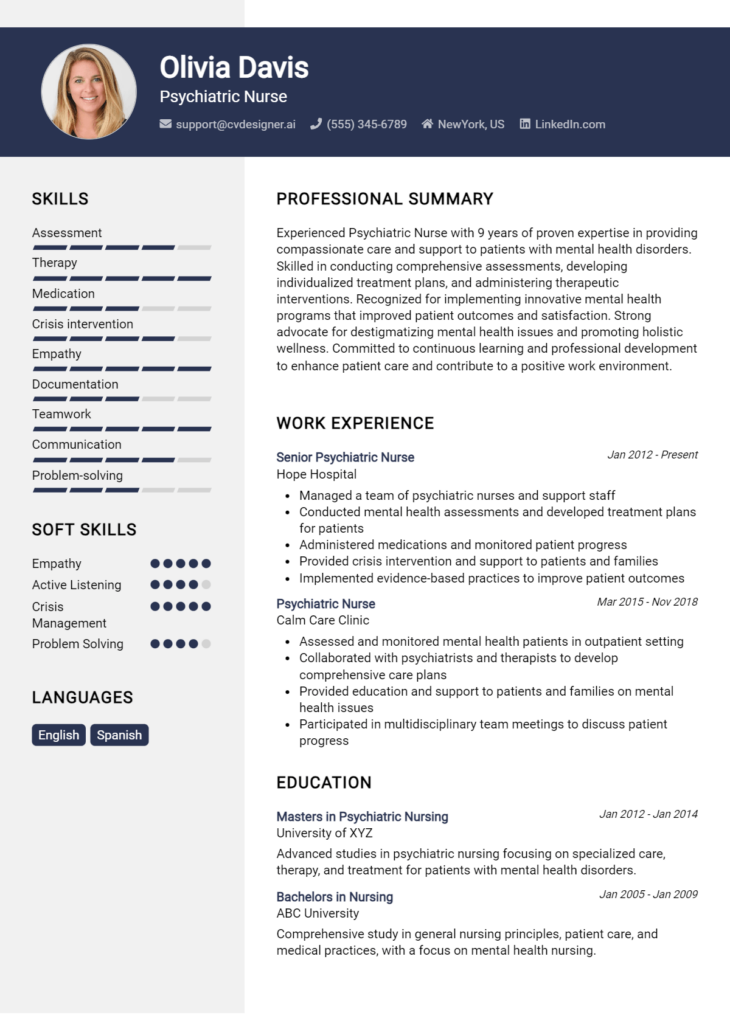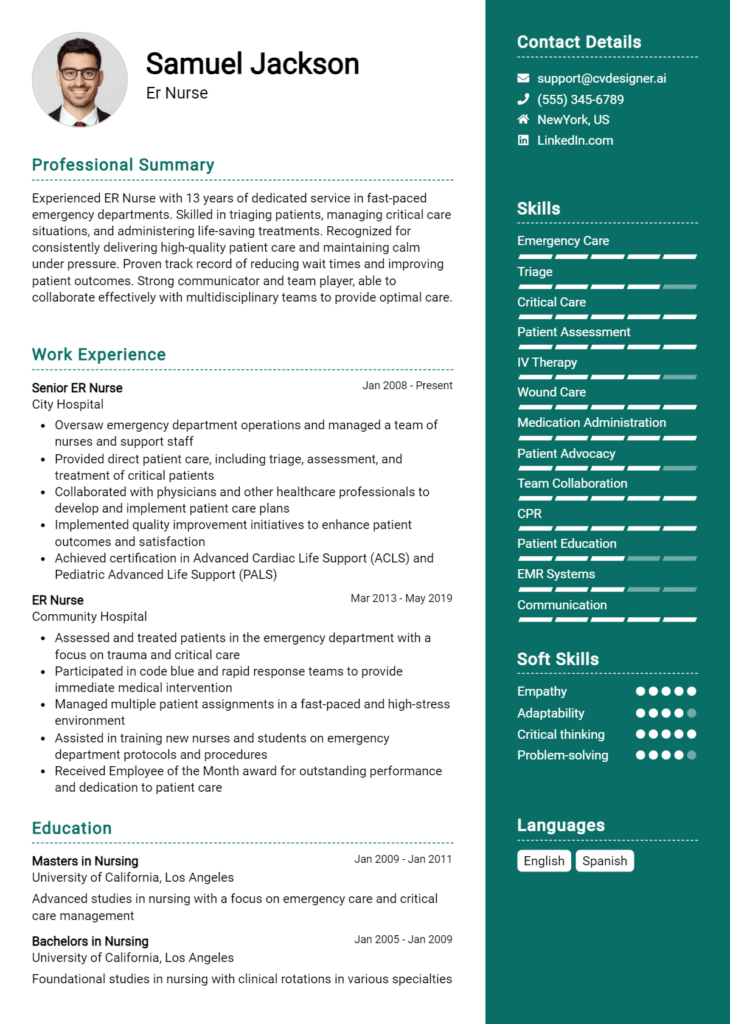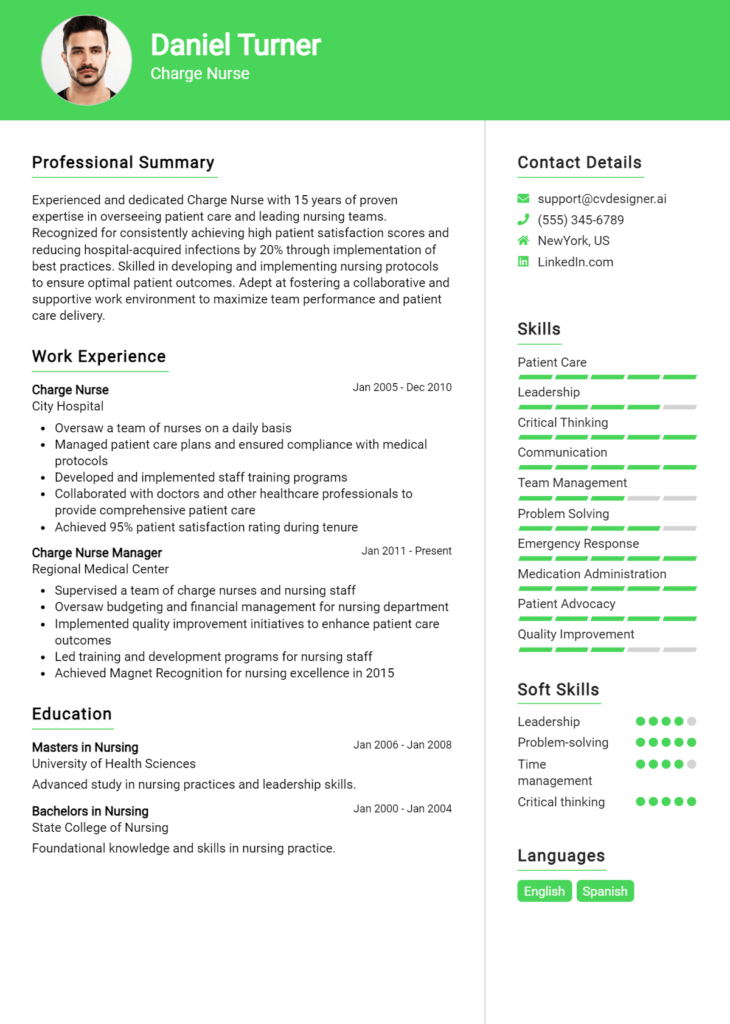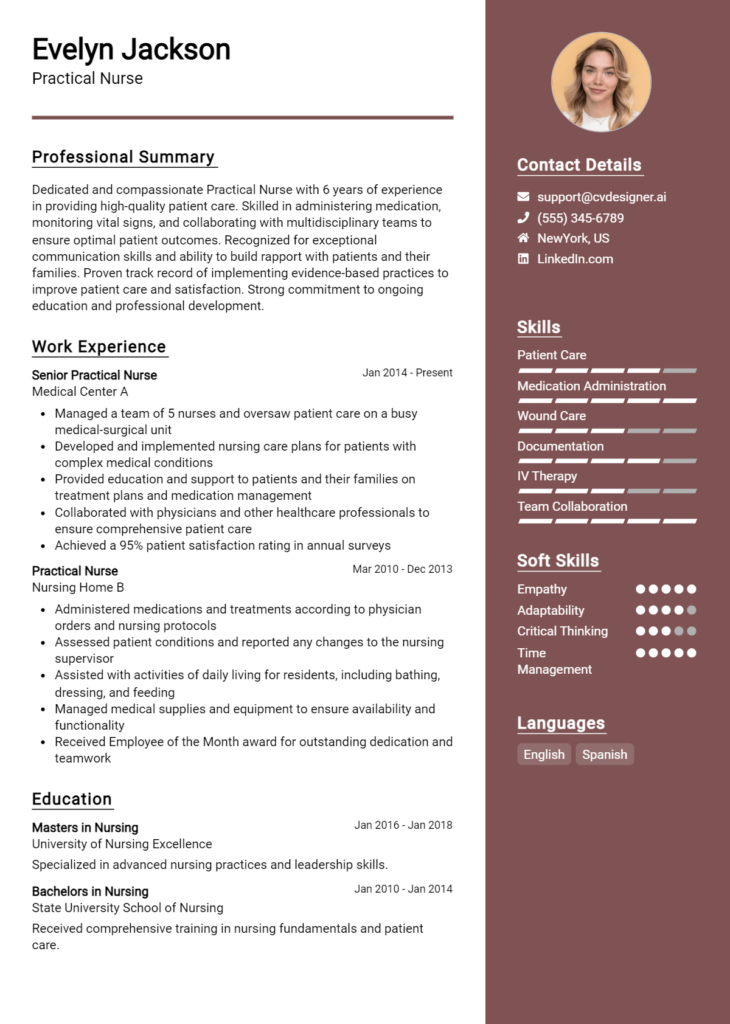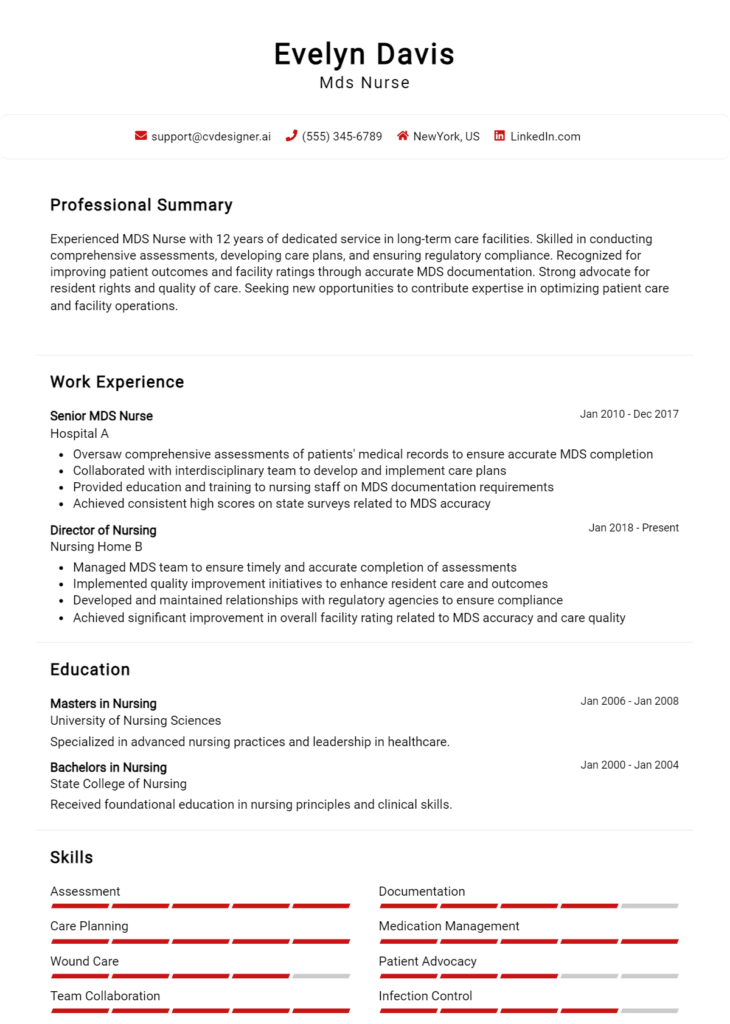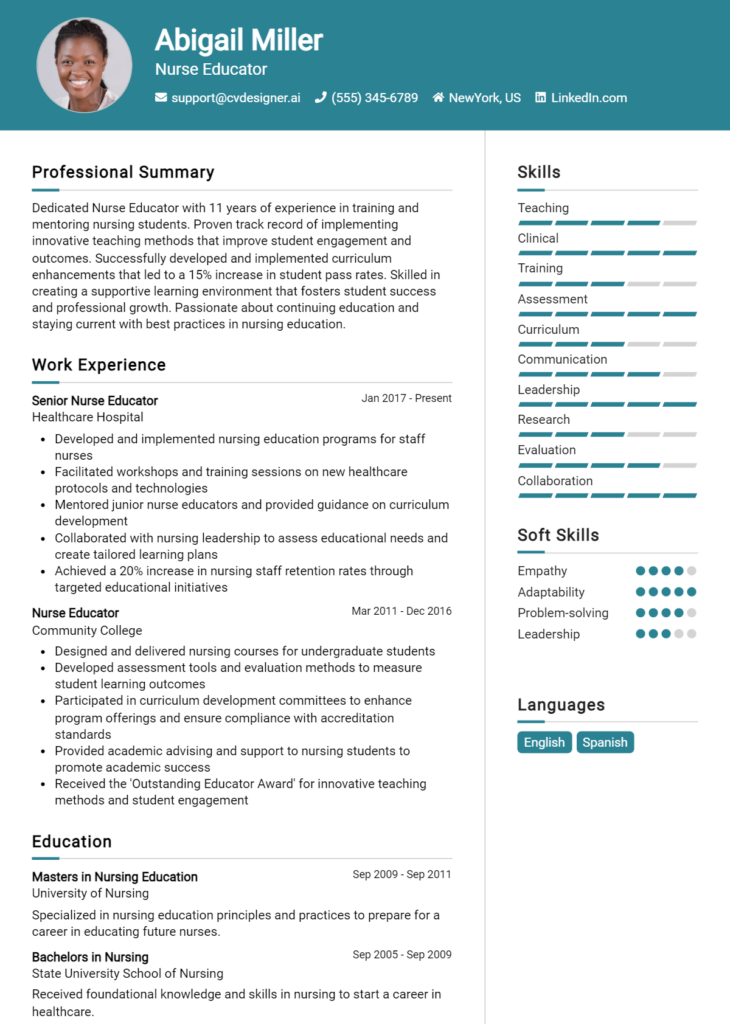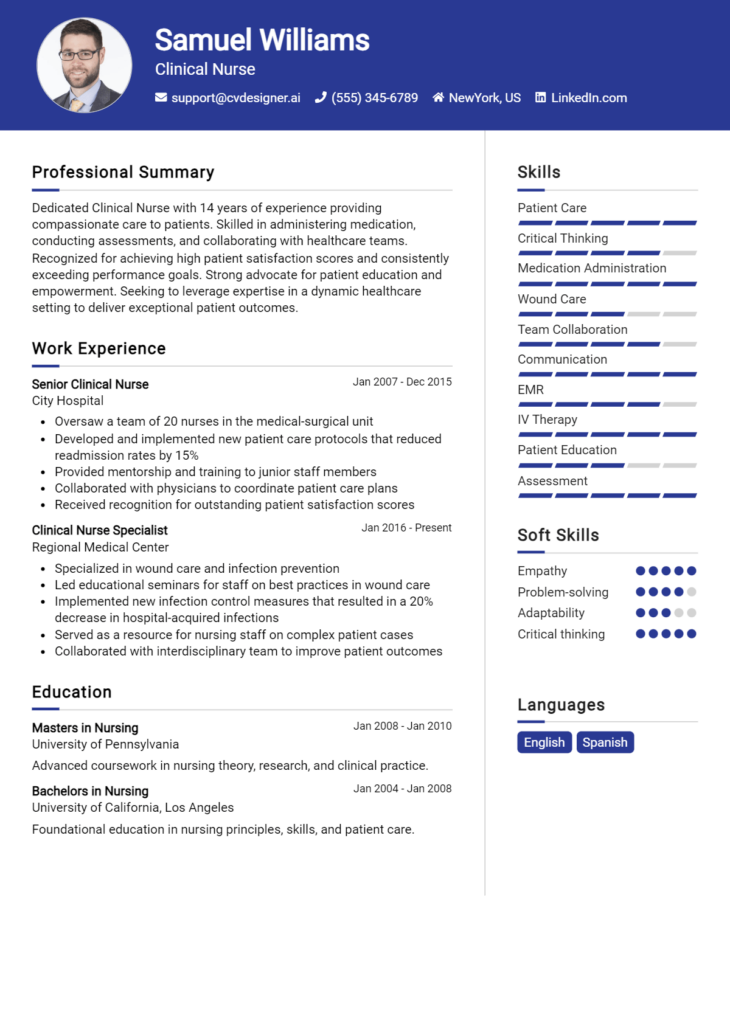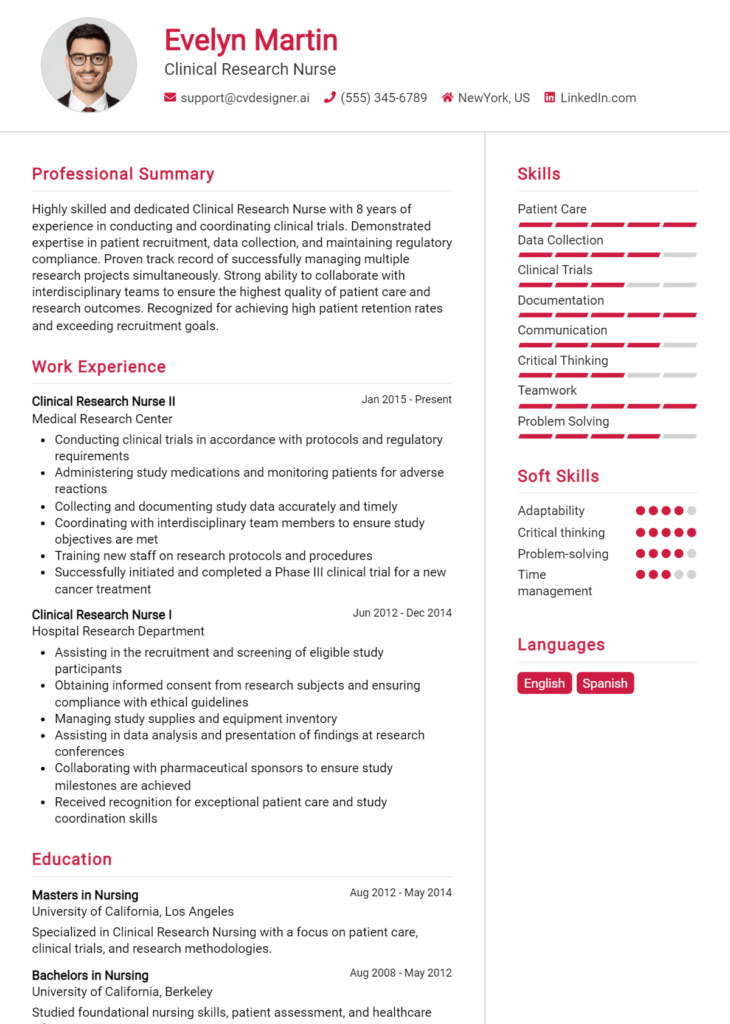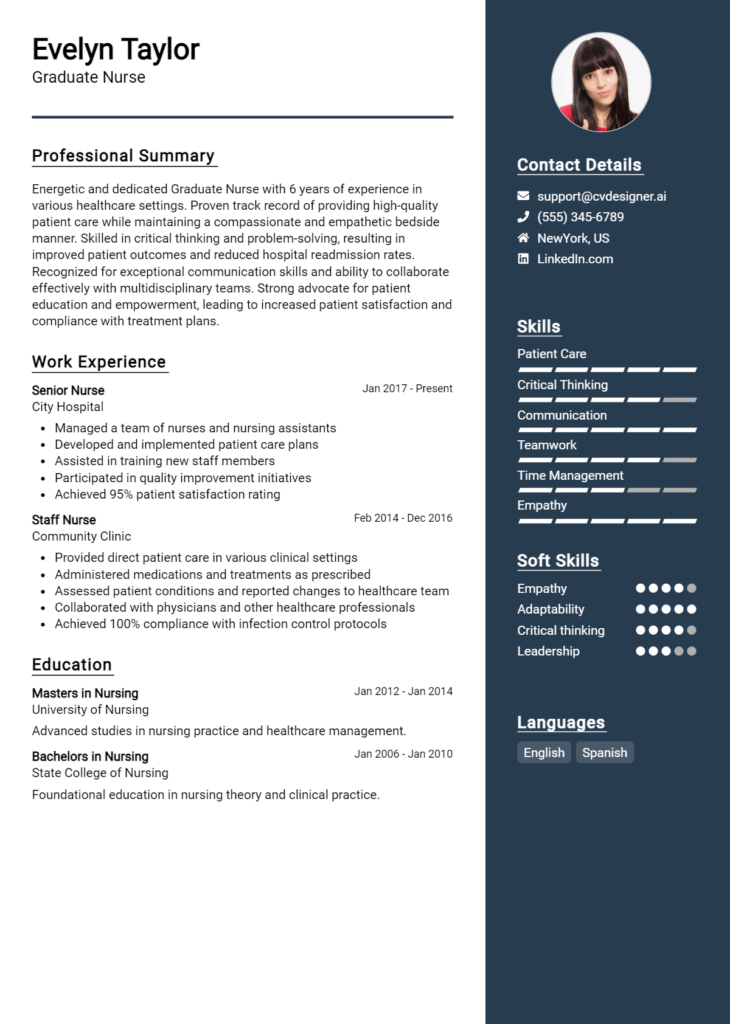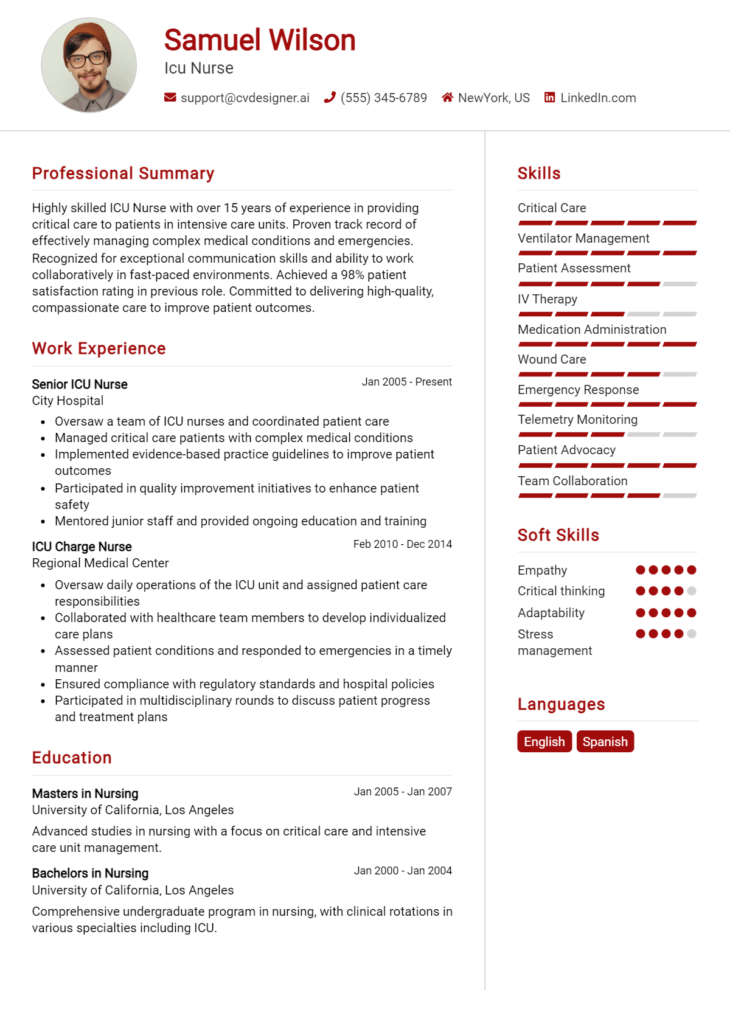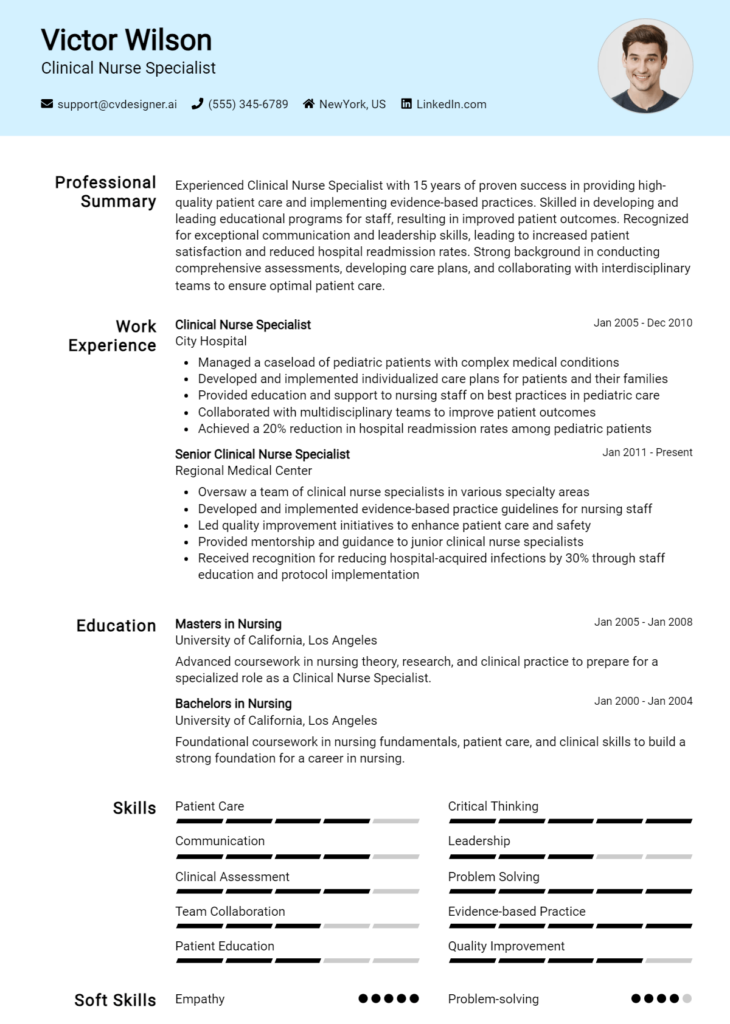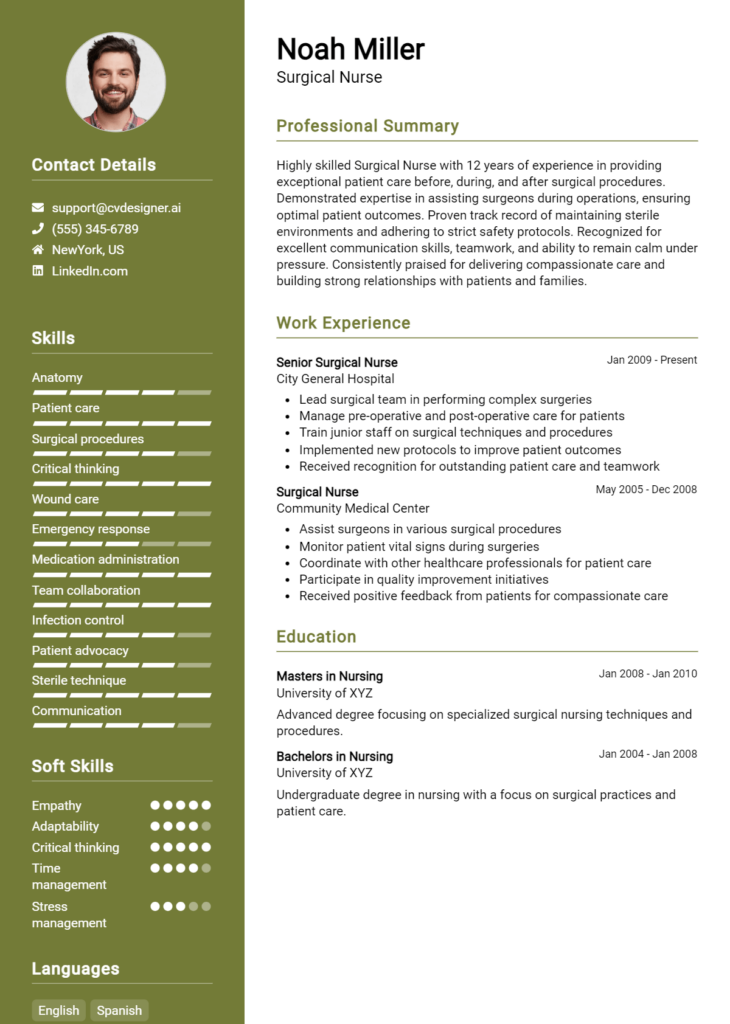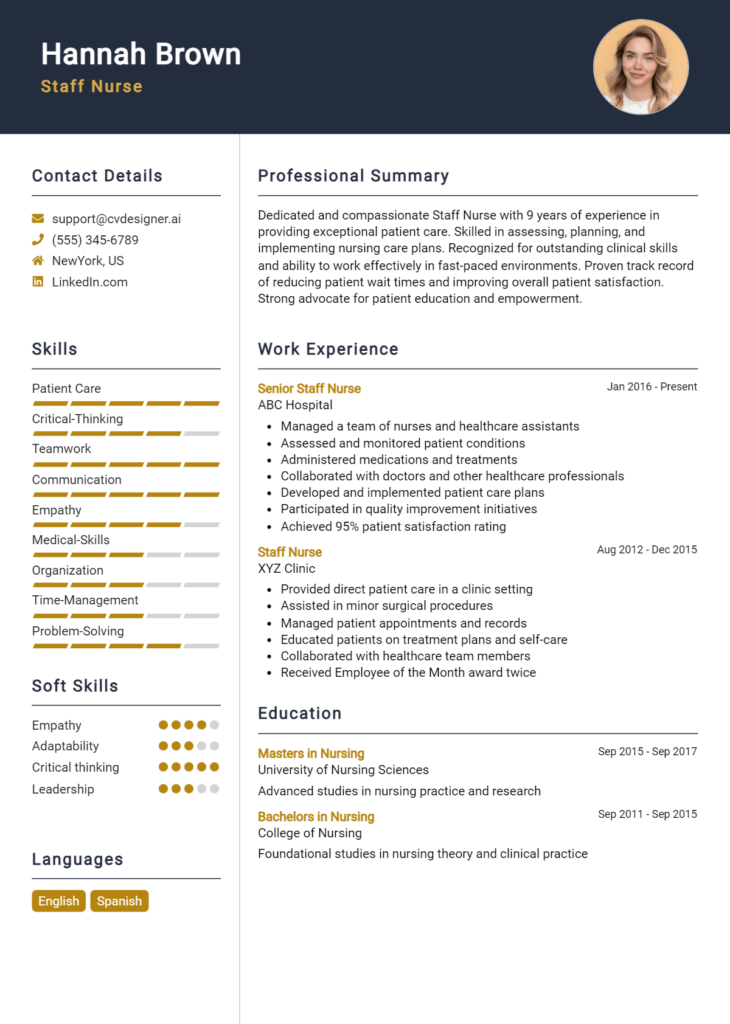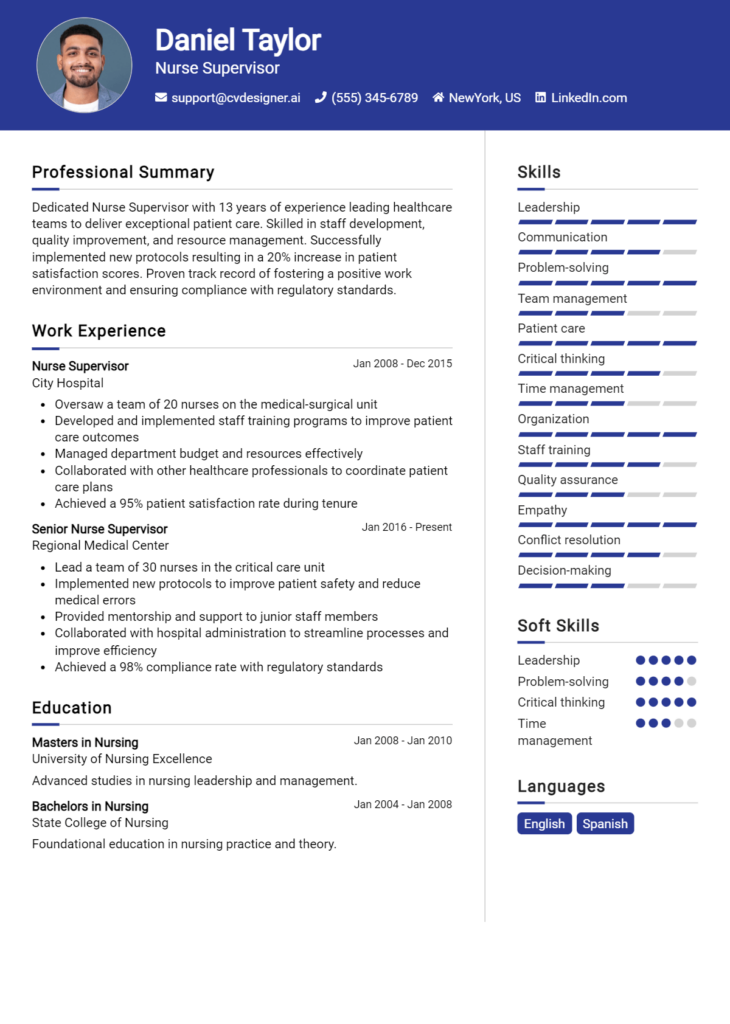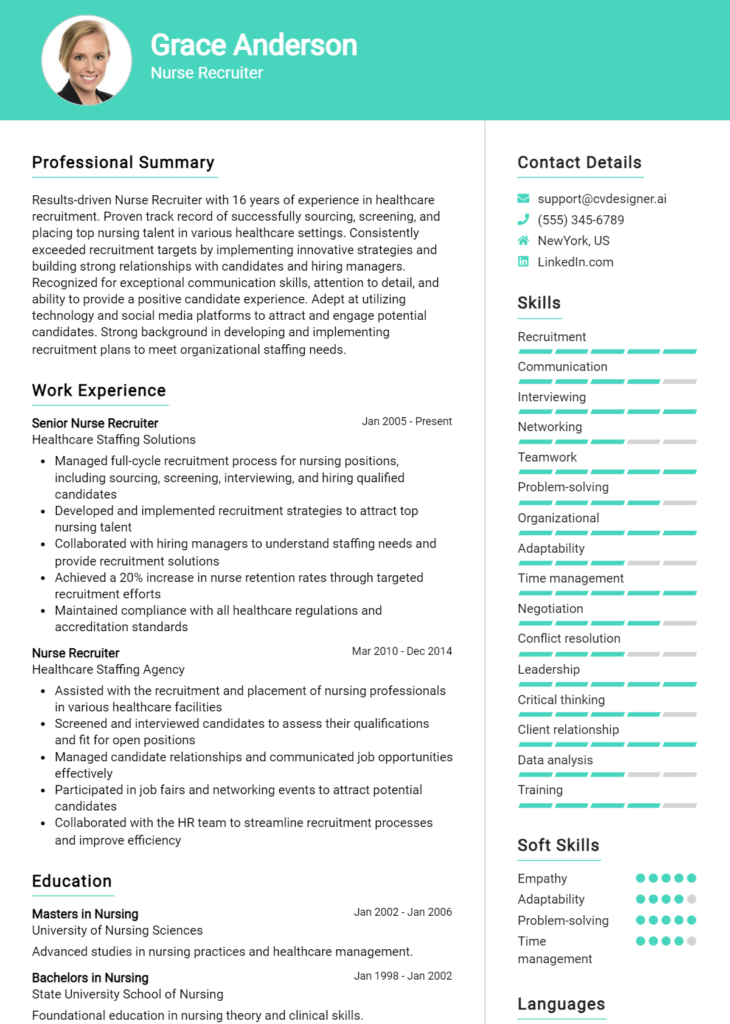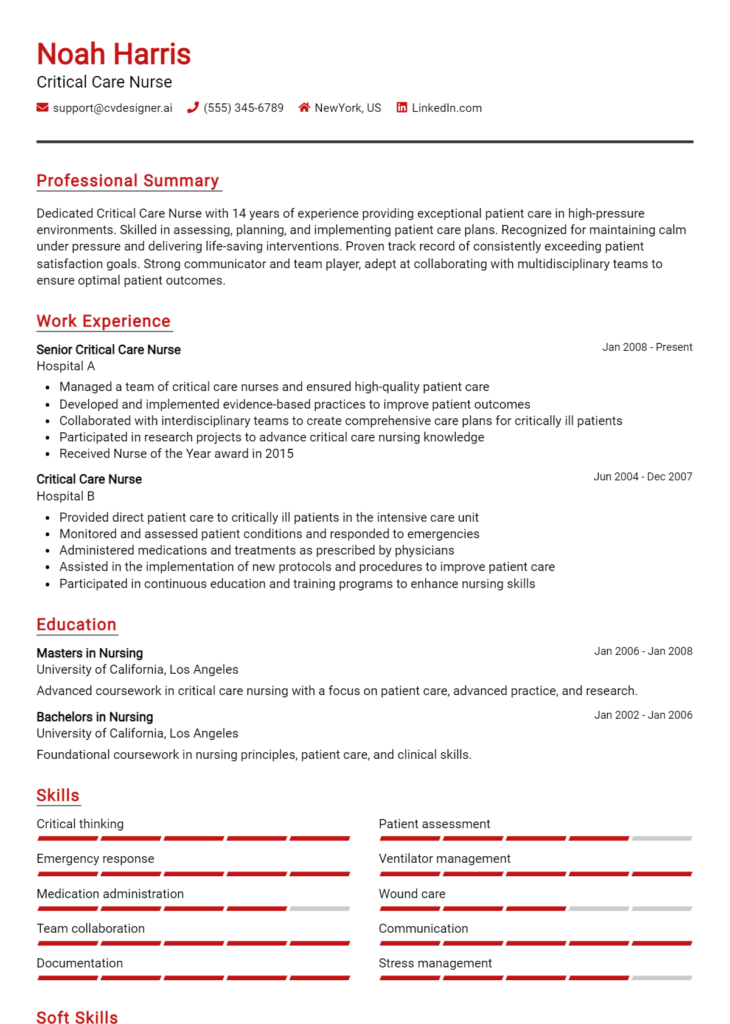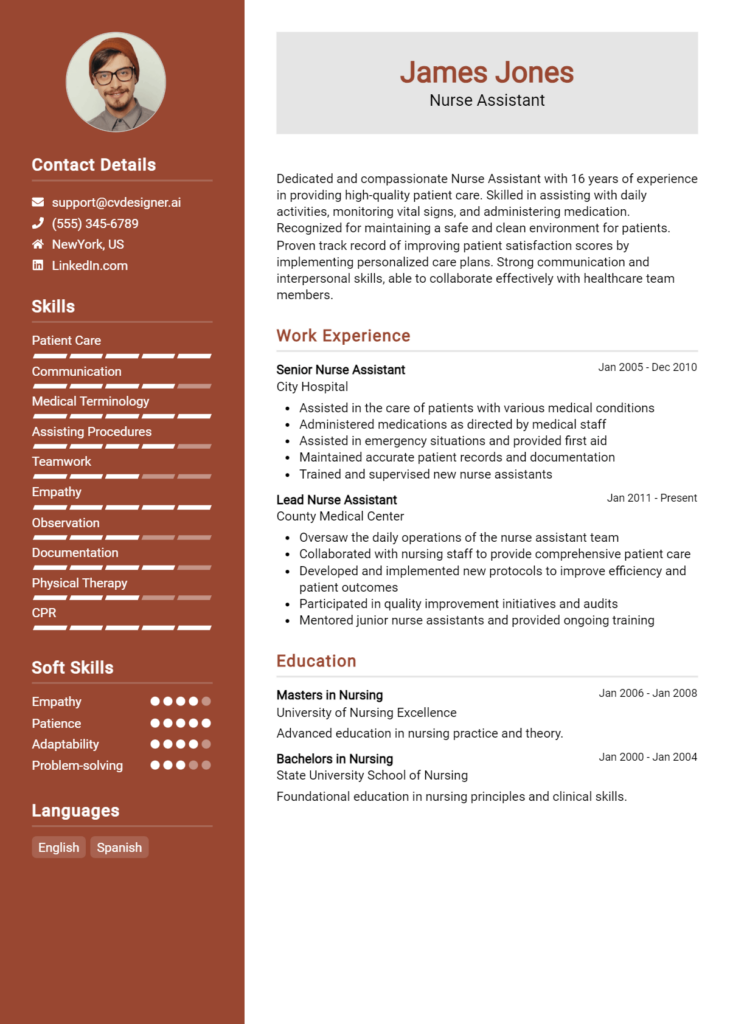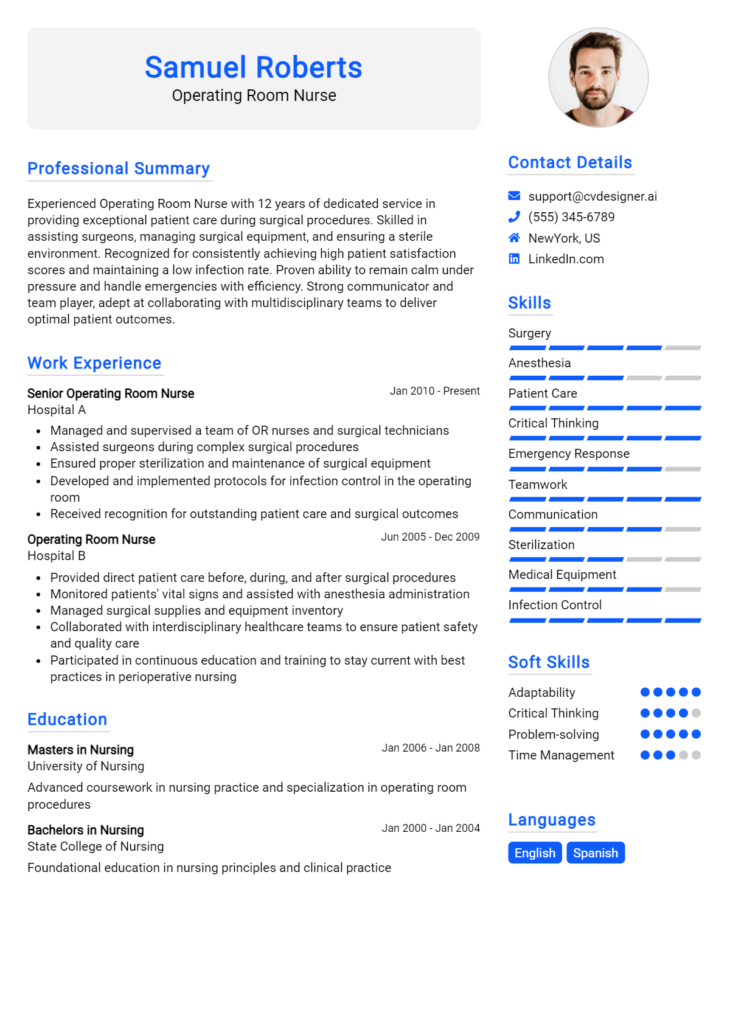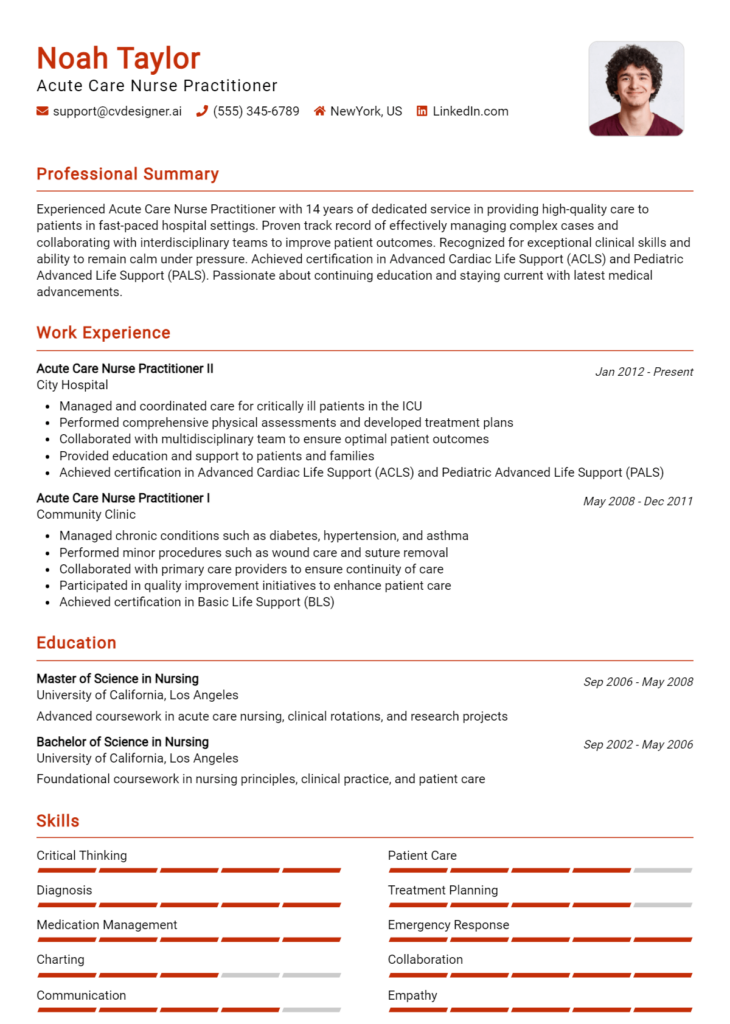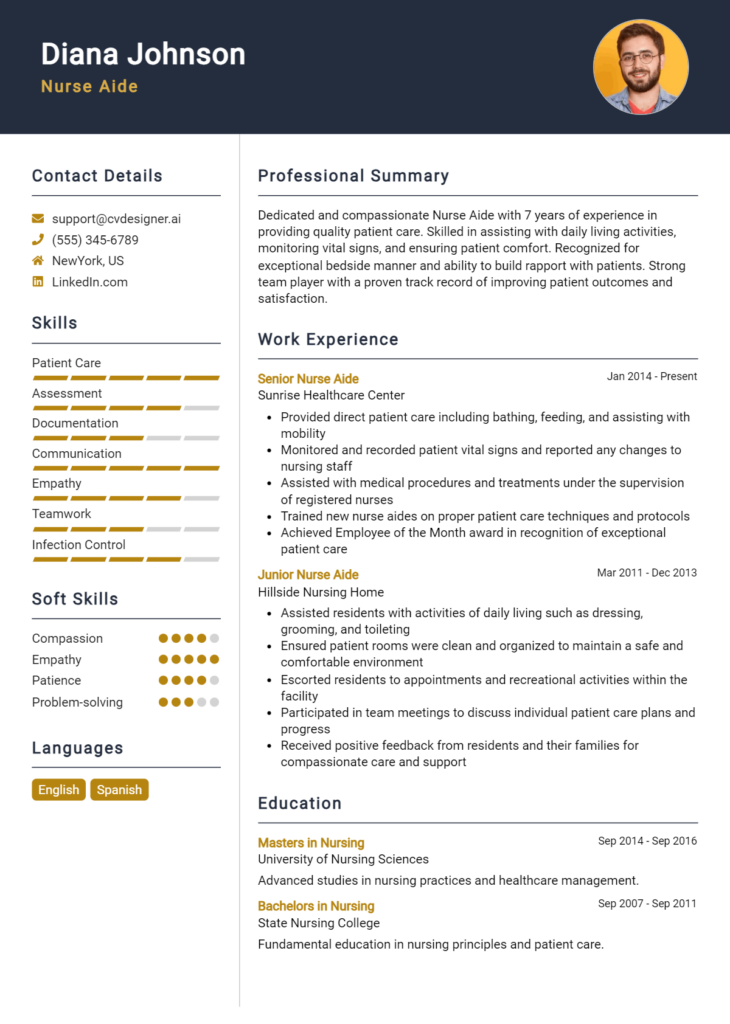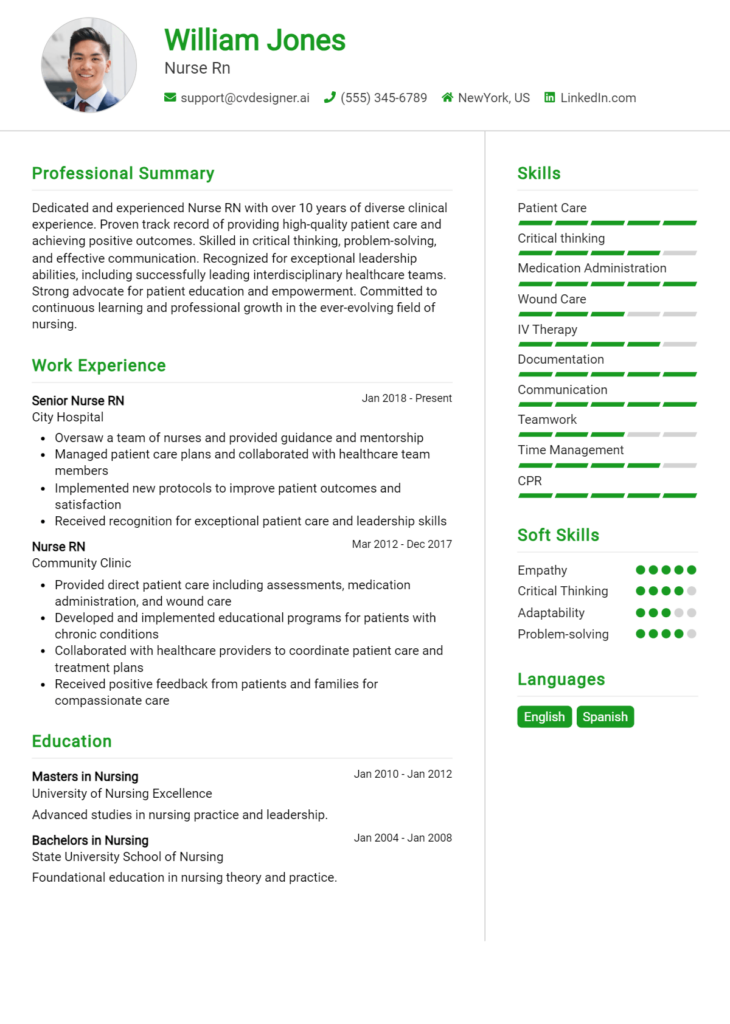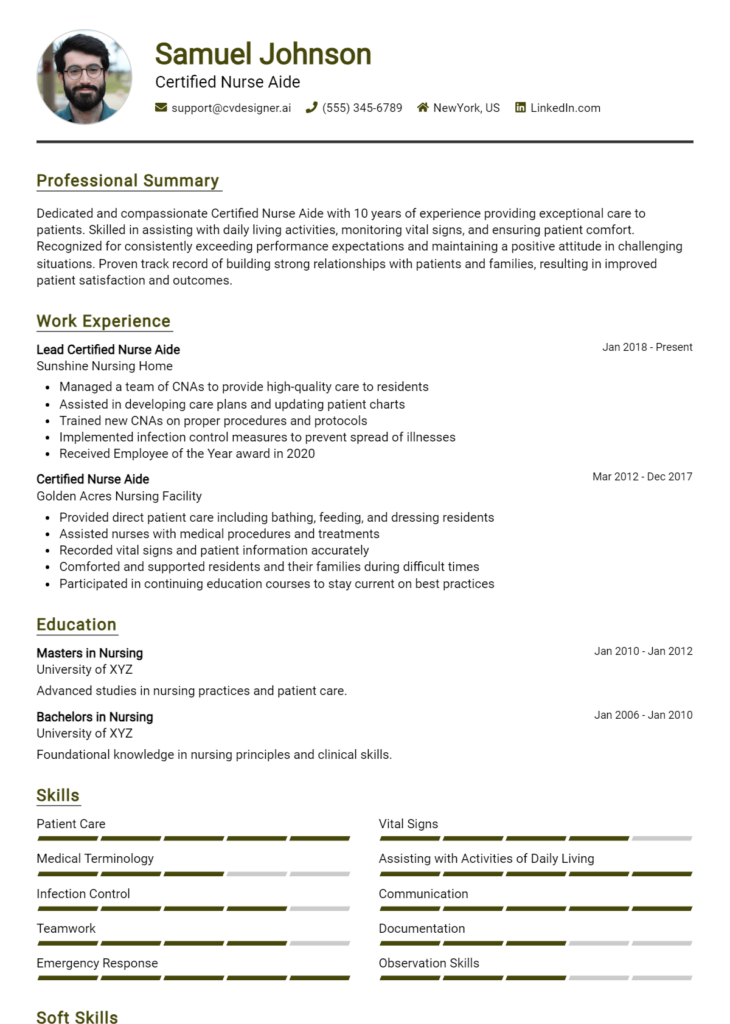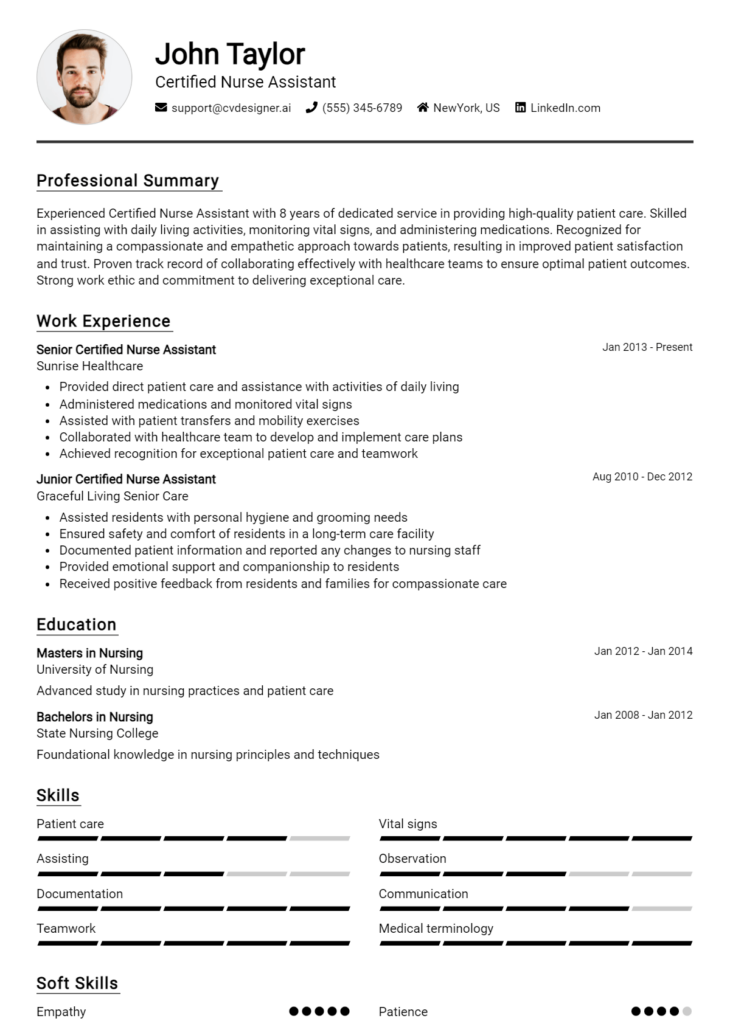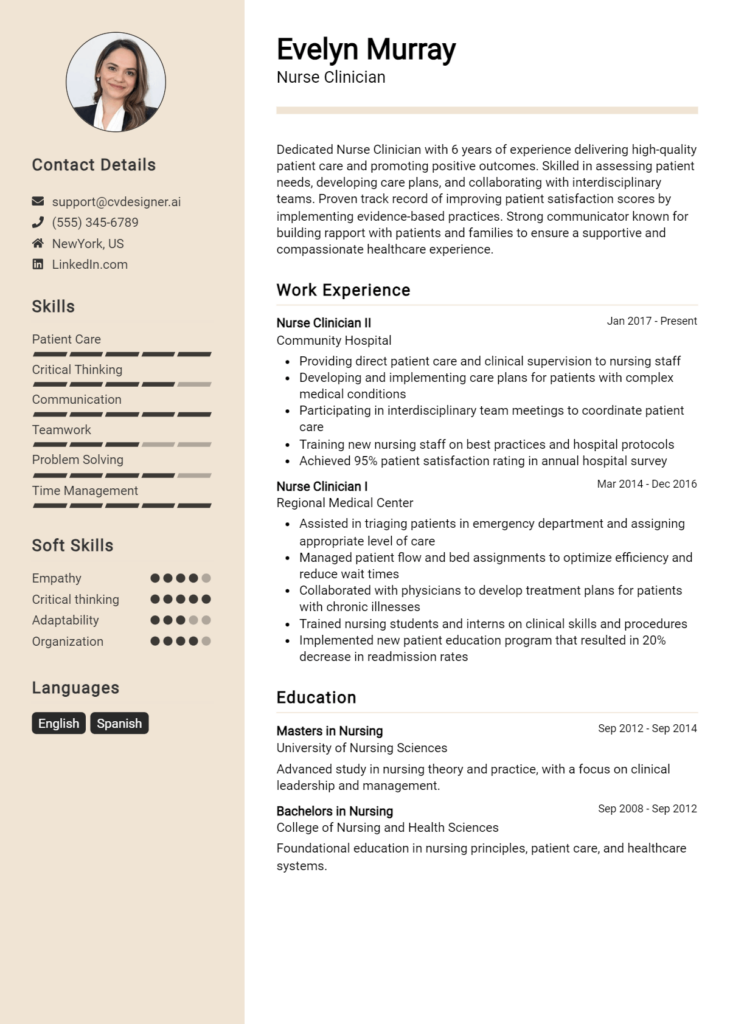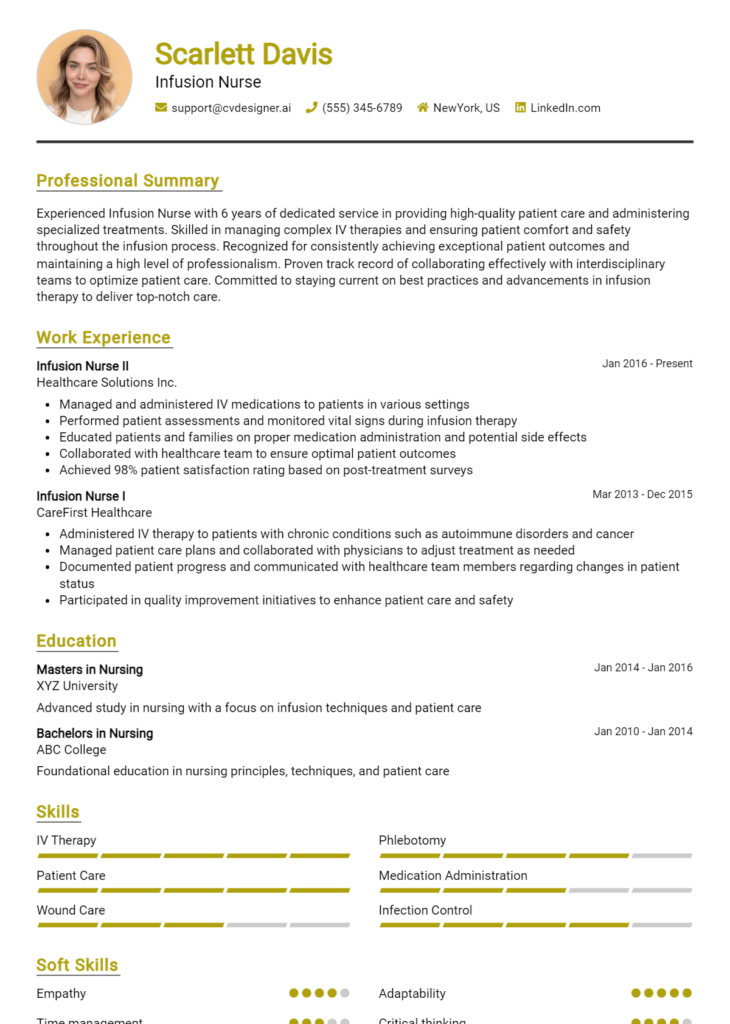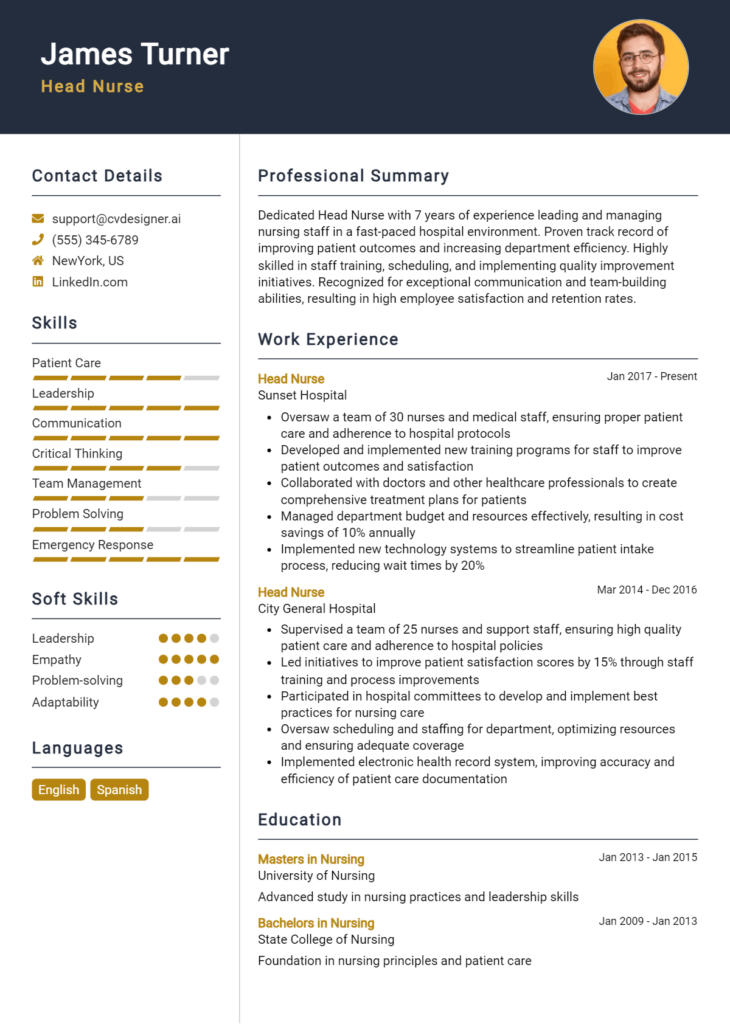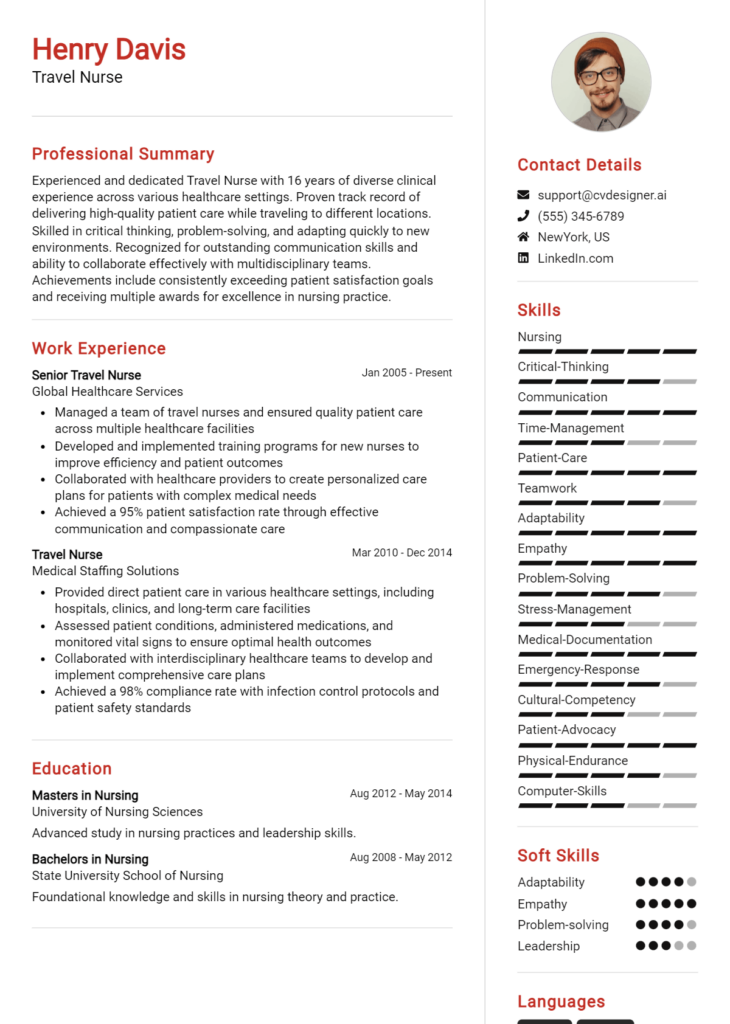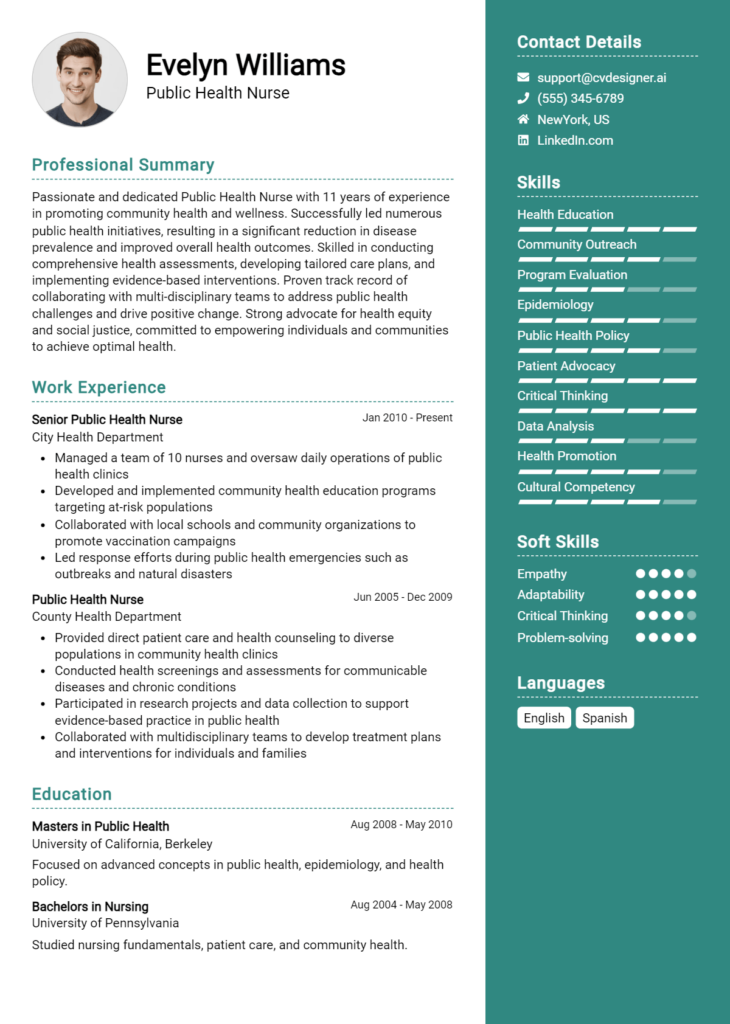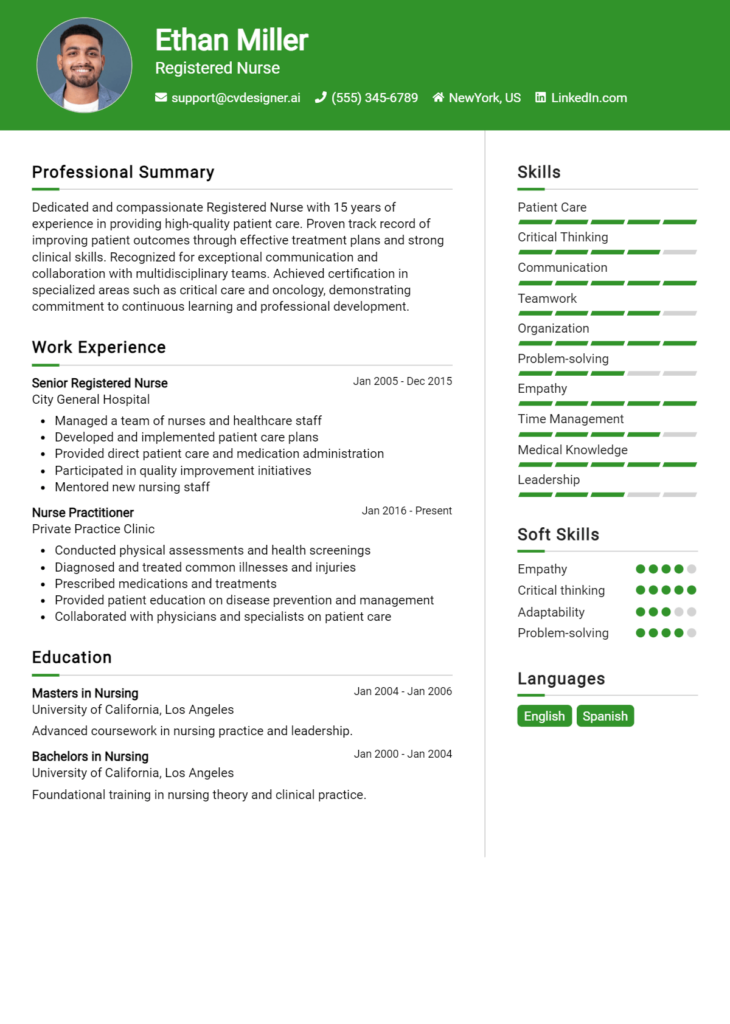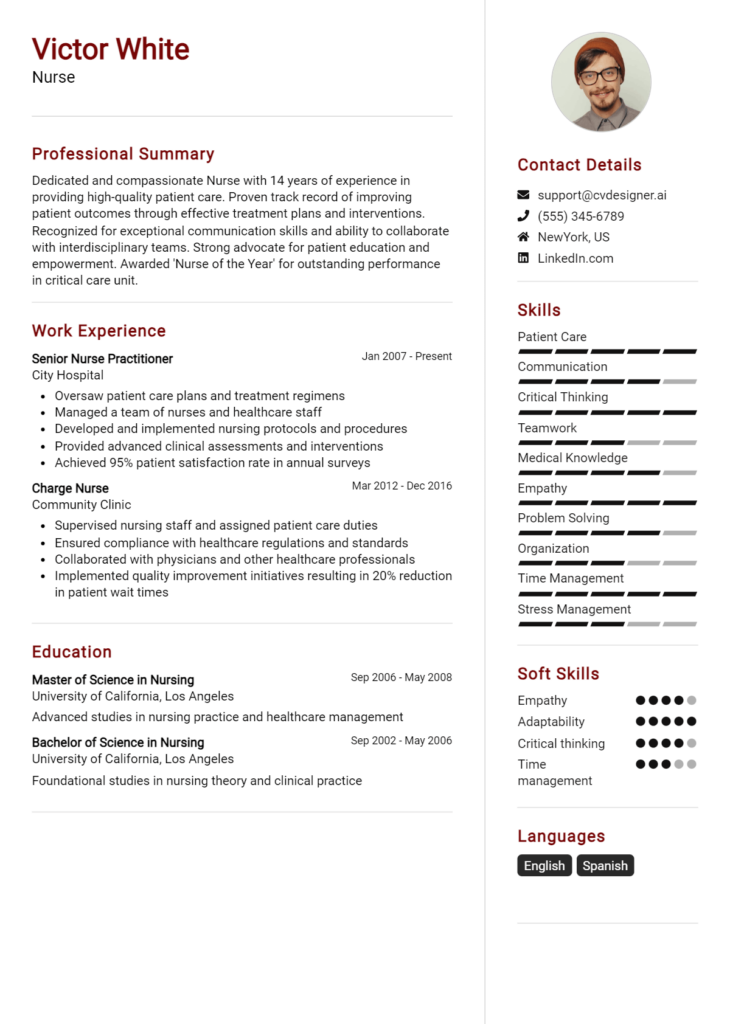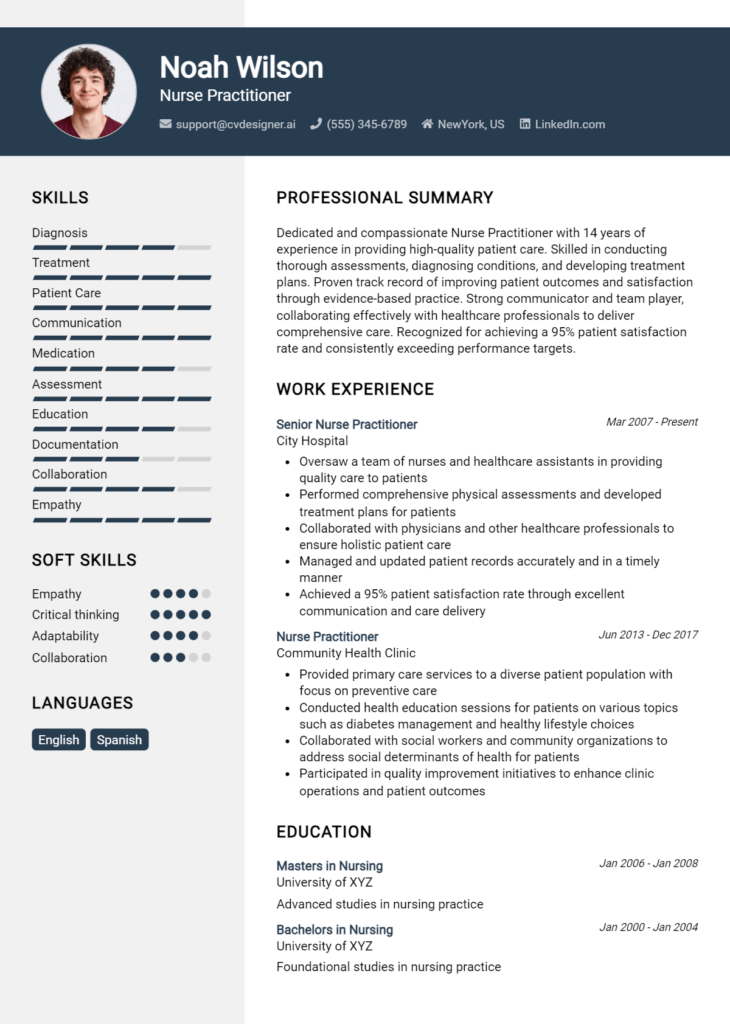Most Popular Research Nurse Resume Examples
Explore additional Research Nurse resume samples and guides and see what works for your level of experience or role.
As a vital link between clinical research and patient care, the role of a Research Nurse is both challenging and rewarding. These dedicated professionals not only contribute to advancing medical knowledge but also ensure the safety and well-being of participants involved in clinical studies. Given the significance of this role, having a well-crafted resume is crucial to stand out in a competitive job market. A strong resume highlights your unique qualifications, experiences, and commitment to the field, ensuring that potential employers recognize your value.
In this comprehensive guide on Research Nurse resume writing, we will explore key responsibilities and essential skills that are pivotal for success in this role. We’ll discuss the best formats to use for your resume, as well as common mistakes to avoid that could hinder your chances of landing an interview. Furthermore, we’ll provide resume examples tailored for various experience levels, alongside practical tips on effective resume writing. Lastly, we’ll offer guidance on selecting the right resume templates that best showcase your qualifications. Whether you're an experienced Research Nurse or just starting your career, this guide will equip you with the knowledge needed to create a standout resume.
Key Responsibilities and Skills for a Research Nurse
As a Research Nurse, you play a pivotal role in clinical trials and research studies, bridging the gap between patient care and research objectives. Your key responsibilities include:
- Patient Recruitment and Consent: Identifying and enrolling eligible participants, ensuring they understand the study's purpose, procedures, and potential risks, and obtaining informed consent.
- Data Collection and Management: Gathering and documenting clinical data, maintaining accurate records, and ensuring compliance with regulatory requirements and study protocols.
- Patient Monitoring: Assessing participants' health status throughout the study, managing any adverse reactions, and providing necessary medical interventions.
- Collaboration with Research Teams: Working closely with principal investigators, data managers, and other healthcare professionals to facilitate research operations and enhance study outcomes.
- Educating Participants: Providing education to patients about the study, treatments involved, and follow-up care, helping to foster trust and cooperation.
- Reporting and Documentation: Preparing and submitting progress reports, ensuring all documentation is thorough and meets ethical guidelines.
Essential skills required for a Research Nurse include:
- Strong clinical assessment and nursing skills
- Excellent communication and interpersonal abilities
- Attention to detail and organizational skills
- Knowledge of research methodologies and regulatory guidelines
- Ability to work collaboratively in a multidisciplinary team
- Proficiency in data management and electronic health record systems
- Critical thinking and problem-solving skills
Highlighting these skills effectively in the resume skills section is crucial, as it allows potential employers to quickly identify your qualifications and fit for the role. Tailoring these responsibilities and skills to match the specific job description will demonstrate your understanding of the position and showcase your relevant experience.
Additionally, consider how these skills could be integrated into a strong CV. A well-crafted CV that reflects your expertise as a Research Nurse will enhance your chances of securing an interview and ultimately landing the position.
Best Resume Format and Structure for a Research Nurse
When crafting a resume for a Research Nurse position, it's essential to adopt a format that effectively showcases your qualifications, experience, and skills. Below is a detailed guide to help you create an impactful resume.
Contact Information
- Name: Use a larger font size for your name to make it stand out.
- Phone Number: Ensure it’s a number where you can be easily reached.
- Email Address: Use a professional email address.
- LinkedIn Profile (optional): Include if your profile is well-developed and relevant to your nursing career.
- Location: City and state are usually sufficient; there’s no need for a full address.
Professional Summary
- Write a brief, compelling summary that highlights your experience as a Research Nurse.
- Focus on your expertise in clinical trials, patient care, and research methodologies.
- Mention any relevant specialties or areas of interest in research.
- Keep it concise—2-4 sentences that succinctly summarize your qualifications and career objectives.
Work Experience
- List your work experience in reverse chronological order (most recent first).
- Include the following for each position:
- Job Title: Clearly state your role.
- Company Name and Location: Include the organization and where it’s located.
- Dates of Employment: Use month/year format (e.g., Jan 2020 - Present).
- Bullet Points: Use bullet points to describe your responsibilities and achievements, focusing on quantifiable outcomes where possible (e.g., “Managed clinical trials involving over 100 patients, improving data collection efficiency by 30%”).
- Tailor your descriptions to highlight experiences relevant to research nursing.
Education
- List your degrees in reverse chronological order.
- Include the following for each degree:
- Degree Title: (e.g., Bachelor of Science in Nursing).
- Institution Name and Location: (e.g., University of XYZ, City, State).
- Graduation Date: Month/Year format.
- Consider including relevant coursework or projects if applicable to research.
Skills
- Create a section dedicated to skills relevant to the Research Nurse role.
- Use bullet points to list both hard and soft skills, such as:
- Clinical trial management
- Data analysis and statistics
- Patient assessment and care
- Strong communication and interpersonal skills
- Knowledge of regulatory requirements (e.g., FDA, IRB)
Certifications
- List any relevant certifications, such as:
- Registered Nurse (RN) license
- Clinical Research Coordinator (CRC)
- Good Clinical Practice (GCP) certification
- Include the issuing organization and date obtained.
Additional Tips
- Formatting: Use a clean, professional layout with consistent font styles and sizes. Maintain ample white space to enhance readability. A chronological or combination format is often best for Research Nurses to highlight both skills and work experience effectively.
- Length: Aim for one page, especially if you have less than ten years of experience. If your experience is extensive, two pages may be appropriate.
- Tailoring: Customize your resume for each job application, emphasizing the most relevant experience and skills for the specific Research Nurse position.
Complementing Cover Letter Format
A well-structured resume pairs effectively with a professional cover letter. Consider the following:
- Consistency: Use the same font and formatting style in your cover letter as in your resume for a cohesive look.
- Personalization: Tailor your cover letter to the specific Research Nurse role, expanding on key experiences mentioned in your resume.
- Engagement: Use your cover letter to tell a compelling story about your passion for research nursing, elaborating on how your experiences make you an ideal candidate.
By following this guide, you’ll create a resume that clearly communicates your qualifications as a Research Nurse, enhancing your chances of landing an interview.
Writing Tips and Best Practices for a Research Nurse Resume
When crafting a resume as a Research Nurse, it's essential to present your qualifications and experiences clearly and professionally to capture the attention of hiring managers. A well-structured resume should highlight your clinical expertise, research capabilities, and any relevant certifications. To enhance your resume's impact, consider incorporating action verbs that convey your contributions effectively. Quantifying your achievements can provide concrete evidence of your skills, while industry-specific keywords will help your resume pass through applicant tracking systems. For a polished look, it's advisable to utilize resume writing tips. Remember, the same principles apply when drafting your cover letter, ensuring consistency across your application materials.
- Use strong action verbs like "conducted," "coordinated," and "monitored" to illustrate your responsibilities and accomplishments.
- Quantify your achievements by including specific metrics or outcomes, such as the number of participants enrolled in a study or the percentage of data accuracy maintained.
- Tailor your resume for each application by incorporating relevant industry-specific keywords from the job description.
- Highlight your certifications, such as Clinical Research Coordinator (CRC) or Clinical Research Associate (CRA), to demonstrate your qualifications.
- Include a dedicated section for research projects you’ve contributed to, detailing your role and the impact of the research.
- Use bullet points for easy reading and to present information in a concise manner.
- Keep your resume to one or two pages, focusing on the most relevant information for the position you’re applying for.
- Ensure your formatting is consistent, using the same font style and size throughout to maintain a professional appearance.
Common Mistakes to Avoid in a Research Nurse Resume
When crafting a resume for a Research Nurse position, it's crucial to present your qualifications and experience in the best possible light. However, many candidates fall into common pitfalls that can undermine their chances of landing an interview. By being aware of these mistakes, you can enhance the clarity and effectiveness of your resume. Here are some of the most frequent errors to avoid:
- Overloading your resume with excessive information that detracts from key qualifications.
- Using generic descriptions that do not highlight specific skills or experiences relevant to research nursing.
- Failing to tailor your resume for the specific job or organization, resulting in a lack of focus.
- Ignoring formatting consistency, which can make the document appear unprofessional.
- Neglecting to quantify achievements, missing an opportunity to showcase your impact in previous roles.
- Including irrelevant work experience that does not contribute to the position you are applying for.
- Using complex jargon or medical terminology that may confuse hiring managers unfamiliar with the specifics.
- Not including relevant certifications or licenses that are essential for a Research Nurse role.
- Overusing passive language instead of action verbs that can bring your experiences to life.
- Forgetting to proofread for grammatical errors and typos, which can create a negative impression.
To further refine your application materials, consider reviewing common mistakes to avoid in a resume and ensure that your cover letter is equally polished by checking out common cover letter mistakes. Addressing these issues can significantly improve your chances of making a positive impact on potential employers.
Sample Research Nurse Resumes
When applying for a position as a Research Nurse, showcasing your relevant experience, skills, and education in a well-structured resume is crucial. Below are three sample resumes tailored for different levels of experience in the field of research nursing. These examples highlight the distinctive qualifications of an experienced professional, an entry-level candidate, and a career changer. For additional inspiration, consider exploring more resume templates and corresponding cover letter examples to enhance your job application package.
Experienced Research Nurse Resume
Jane Doe
123 Main St, Anytown, USA 12345
(555) 123-4567
janedoe@email.com
Summary
Dedicated and detail-oriented Research Nurse with over 8 years of experience in clinical trials and patient care. Proven ability to ensure compliance with regulatory requirements and maintain high standards of patient safety. Strong communication skills, adept at collaborating with multidisciplinary teams to achieve research goals.
Professional Experience
Senior Research Nurse
ABC Clinical Research, Anytown, USA
June 2018 – Present
- Lead and coordinate clinical trials, ensuring adherence to protocols and regulatory guidelines.
- Develop and implement patient recruitment strategies, increasing enrollment by 25%.
- Collaborate with principal investigators to monitor patient progress and data collection.
Research Nurse
XYZ Medical Center, Anytown, USA
April 2015 – May 2018
- Assisted in conducting Phase II and III clinical trials for oncology studies.
- Educated patients on trial protocols and informed consent procedures, enhancing patient understanding and retention.
- Managed patient assessments and adverse event reporting, ensuring timely documentation.
Education
Bachelor of Science in Nursing (BSN)
University of Anytown, Anytown, USA
Graduated: May 2015
Certifications
- Certified Clinical Research Coordinator (CCRC)
- Basic Life Support (BLS)
Entry-Level Research Nurse Resume
John Smith
456 Elm St, Anytown, USA 12345
(555) 987-6543
johnsmith@email.com
Summary
Enthusiastic and motivated nursing graduate seeking an entry-level Research Nurse position. Strong foundation in nursing principles with a keen interest in clinical research. Excellent communication and organizational skills with a commitment to patient care and ethical research practices.
Education
Bachelor of Science in Nursing (BSN)
University of Anytown, Anytown, USA
Graduated: May 2023
Clinical Experience
Nursing Intern
Anytown General Hospital, Anytown, USA
January 2023 – April 2023
- Assisted registered nurses in patient care and data collection for clinical studies.
- Participated in patient education and support, ensuring comprehension of treatment plans and research protocols.
- Documented patient vital signs and responses accurately, contributing to research data integrity.
Skills
- Patient assessment and monitoring
- Strong written and verbal communication
- Knowledge of research protocols and ethics
- Proficient in Microsoft Office Suite
Career Changer Research Nurse Resume
Emily Johnson
789 Oak St, Anytown, USA 12345
(555) 321-9876
emilyjohnson@email.com
Summary
Compassionate healthcare professional transitioning to a Research Nurse role after 5 years of experience as a Clinical Laboratory Scientist. Strong analytical and problem-solving skills, with a passion for advancing medical research and improving patient outcomes.
Professional Experience
Clinical Laboratory Scientist
DEF Medical Labs, Anytown, USA
March 2018 – Present
- Conducted laboratory tests and analyses to support clinical decision-making.
- Collaborated with healthcare providers to interpret test results and provide recommendations for patient management.
- Quality assurance and compliance management, ensuring laboratory standards are met.
Education
Bachelor of Science in Clinical Laboratory Science
University of Anytown, Anytown, USA
Graduated: February 2018
Skills
- Proficient in laboratory techniques and data analysis
- Understanding of clinical trial processes
- Strong attention to detail and organizational skills
- Excellent teamwork and communication abilities
For further assistance, don’t forget to check out additional resume templates and cover letter examples to create a comprehensive job application package.
Checklist for a Research Nurse Resume
- Proofread for Typos and Grammatical Errors: Carefully read through your resume to catch any spelling mistakes or grammatical issues. Consider using tools like Grammarly for assistance.
- Check for Consistency in Formatting: Ensure that fonts, bullet points, and spacing are uniform throughout the document. Consistent formatting enhances readability and professionalism.
- Tailor Your Resume to the Job Description: Highlight relevant skills and experiences that align with the specific requirements of the Research Nurse position you are applying for. Use keywords from the job description.
- Include Relevant Certifications and Licenses: Make sure to list any nursing licenses, certifications (like CPR or clinical research certifications), and any specialized training that is pertinent to the research field.
- Quantify Achievements: Where possible, use numbers to demonstrate your impact in previous roles (e.g., "Managed a clinical trial with 50 participants" or "Improved patient recruitment rates by 30%").
- Highlight Research Experience: Clearly outline your experience in clinical trials, including any specific studies you worked on and your role in them. This is crucial for a Research Nurse position.
- Mention Soft Skills: Include soft skills that are essential for a Research Nurse, such as communication, teamwork, and attention to detail, and provide examples of how you've demonstrated these in your work.
- Review Contact Information: Double-check that your contact details, including email and phone number, are current and correctly formatted.
- Use an AI Resume Builder: Consider utilizing an AI resume builder to ensure that all elements of your resume are well-organized and visually appealing.
- Create a Similar Checklist for Other Documents: Remember that a similar checklist can be followed for crafting your CV or cover letter to maintain consistency across all application materials.
Key Takeaways for a Research Nurse Resume Guide
In conclusion, crafting a strong Research Nurse resume is essential for showcasing your unique skills and experiences in the clinical research landscape. By utilizing the examples and tips provided, you can create a compelling resume that highlights your qualifications and sets you apart from other candidates. To take your application to the next level, consider downloading a template from our resume templates or cover letter templates. You can also explore our user-friendly resume maker to streamline the process further. Remember, adhering to similar guidelines will also enhance your CV and cover letter, making a cohesive and professional impression. For additional resources, check out our CV templates and discover how to write an effective cover letter. Start your journey towards a successful application today!
